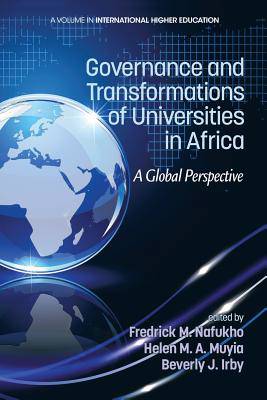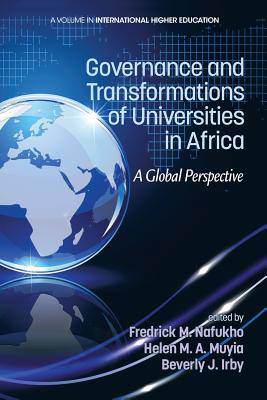
- Afhalen na 1 uur in een winkel met voorraad
- Gratis thuislevering in België vanaf € 30
- Ruim aanbod met 7 miljoen producten
- Afhalen na 1 uur in een winkel met voorraad
- Gratis thuislevering in België vanaf € 30
- Ruim aanbod met 7 miljoen producten
Zoeken
Governance and Transformations of Universities in Africa
A Global Perspective
€ 84,95
+ 169 punten
Omschrijving
A volume in International Higher Education Series Editors Fredrick M. Nafukho, Texas A&M University; and Beverly Irby, Texas A&M University While universities world over are undergoing reforms and change, in the case of African universities as illustrated in this book, the reforms and changes are profound and can best be described as transformative. This book is unique in many ways, which makes it extraordinary. First, unlike other books that have examined issues on higher education in Africa from externalist positions, the contributors to this book are scholars who have been educated, are currently teaching in African universities or have taught in African universities. The book specifically focuses on transformations in the governance of African universities and its implications on equity, entrepreneurship, innovation, quality assurance, information and communication technologies (ICTs), and reform issues in higher education in Africa. The book presents pertinent research on governance in African universities in an experiential and empirical manner. The contributors of the book chapters include individuals actively involved in teaching, researching and governance of higher education institutions in Africa. The chapters are based on empirical data, including review of relevant literature. The book also recognizes that university governance is more than just crisis in financial or economic issues, but includes best management practices, shared governance, meaningful reforms, strategic planning, consultation, transparency and accountability, client (students, lecturers, parents and the public) satisfaction, as well as the role of the university in development. The contributions take cognizance of the fact that governance as a concept is facing fundamental changes in the context of global knowledge economy, and African local conditions. Contributors also take cognizance of the fact that one important source of change in Africa has been the accelerating speed of scientific and technological advancement in learning at universities where lifelong learning programs, adult learning programs, distance and online learning are relatively new. The chapters are also sensitive to new changes in gender, demographical, technological, education reforms, social and economic transformations in the governance of African universities. The book is basically an academic book for use by undergraduates and graduate students at universities, policy makers and formulators in African ministries of Education; supra national organizations, foreign organizations working in Africa, NGOs and CBOs as well as development stakeholders, and community organizers.
Specificaties
Betrokkenen
- Uitgeverij:
Inhoud
- Aantal bladzijden:
- 224
- Taal:
- Engels
- Reeks:
Eigenschappen
- Productcode (EAN):
- 9781623967413
- Verschijningsdatum:
- 20/06/2014
- Uitvoering:
- Paperback
- Formaat:
- Trade paperback (VS)
- Afmetingen:
- 156 mm x 234 mm
- Gewicht:
- 317 g

Alleen bij Standaard Boekhandel
+ 169 punten op je klantenkaart van Standaard Boekhandel
Beoordelingen
We publiceren alleen reviews die voldoen aan de voorwaarden voor reviews. Bekijk onze voorwaarden voor reviews.










